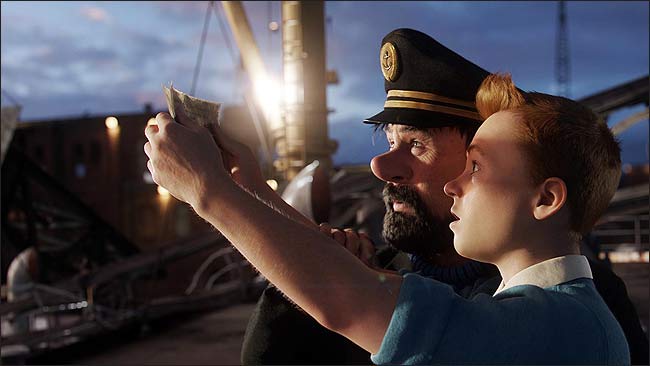

All Flash, No Heart
Pretty Tintin won’t make new fans
THE ADVENTURES OF TINTIN: Directed by Steven Spielberg. Screenplay by Steven Moffat, Edgar Wright and Joe Cornish, based on the books by Hergé. Music, John Williams. Editor, Michael Kahn. Starring Jamie Bell, Andy Serkis, Daniel Craig, Simon Pegg, Nick Frost and Toby Jones. Paramount Pictures, 2011. PG. 107 minutes. Two and a half stars.
How did professional heartstring-tugger Steven Spielberg and Peter Jackson — a man who said, “I read Tintin before I could read” — manage to make a Tintin movie with so little heart? Spielberg’s big, showy 3D holiday film is exactly the opposite of Martin Scorsese’s: In Hugo, the technical beauty steps aside for a lovely story with quickly but effectively drawn characters. In The Adventures of Tintin, the beauty of the animation is compelling, yet it can’t buoy up the story or its one-note characters. Tintin (Jamie Bell) is intrepid; Captain Haddock (Andy Serkis) is drunk; Daniel Craig’s villainous Sakharine is … determined? Tintin’s always-adorable dog, Snowy, has more charm and depth than these human characters put together.
The Adventures of Tintin uses plot elements from a few of Hergé’s books, primarily The Secret of the Unicorn. It’s not an origin story, though it does introduce Tintin, already a famous boy reporter, to Haddock. Tintin’s pals Thomson and Thompson (Nick Frost and Simon Pegg) show up, as does Bianca Castafiore (Kim Stengel). There are several visual references to other Tintin adventures, all of which are crammed into a whiz-bang story that, despite crossing oceans and deserts, begins to drag fairly early. The movie is a bit like Raiders of the Lost Ark, minus any attempt to get you emotionally invested. If it didn’t work for me — who, as a kid, devoured Hergé’s books in repeated readings — how hollow must it feel to those just meeting Tintin? You can’t coast on an audience’s existing affection for a character when there is no affection, and Tintin just isn’t a household name in the U.S.
I’m not sure at whose feet to lay the blame for Tintin’s blandness. Spielberg has his flaws, but he’s shown again and again that he can hook audiences, whether we’re cheering for Indiana Jones or tearing up at the end of E.T. His writing team is a cross-section of British talent: Edgar Wright (Shaun of the Dead), Joe Cornish (the stellar Attack the Block) and Steven Moffat, the man behind the frustrating but affecting recent seasons of Doctor Who. Jamie Bell has the perfect voice for Tintin, plucky and stubborn; the invaluable Andy Serkis disappears into Haddock; and the other characters have so little to do that it’s difficult to credit or fault them for much.
The film feels overpadded; a subplot about a pickpocket is lifted straight from the books, but adds nothing to Tintin’s bustling story. At first the style is distracting, the images caught in an awkward space between cartoon and live-action. But it’s tricksy; after 15 minutes or so, you may find you’ve stopped thinking about it, other than to admire how realistically Tintin’s goofy hair blows in the ocean breeze or to note how difficult the elaborate action sequences would have been had the filmmakers worked with real people and real physics.
These are the things I want to be thinking about after the film, not during it, and this is why Tintin fails: There’s nothing beyond the lovely surface. Rather than caring what happens, I cared — a little — about the pretty waves, the painstaking attention to detail, the deep, shadowy lighting, the way the design reflected and enhanced images I remembered from the books. Everything’s there on the screen, but to what end? If Spielberg and Jackson hoped to induce a new generation to fall in love with Tintin, their film falls far short. On the plus side, you’ll probably get to see the trailer for the first of Jackson’s two Hobbit films, which succeeds in a few minutes in every way Tintin fails in almost two hours. Here’s to next year’s adventures.